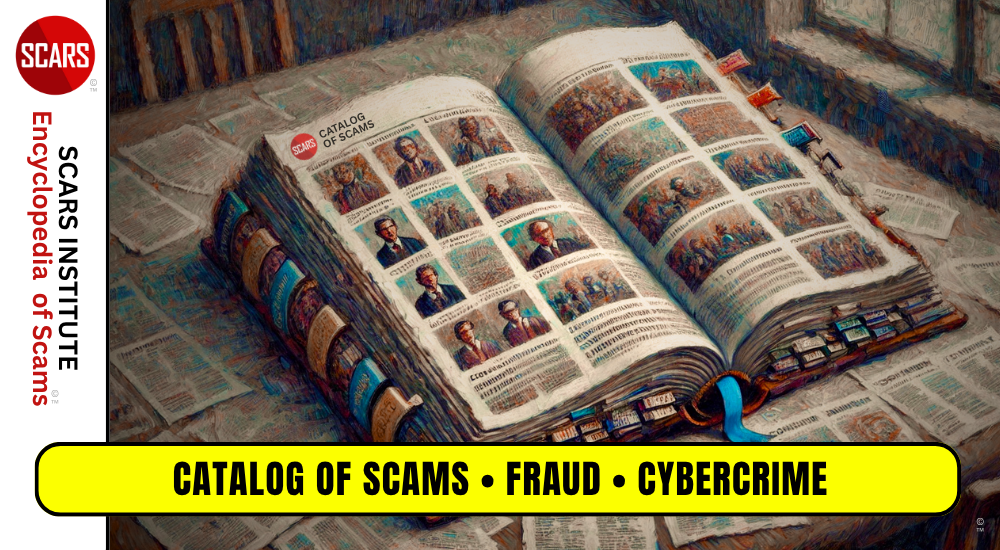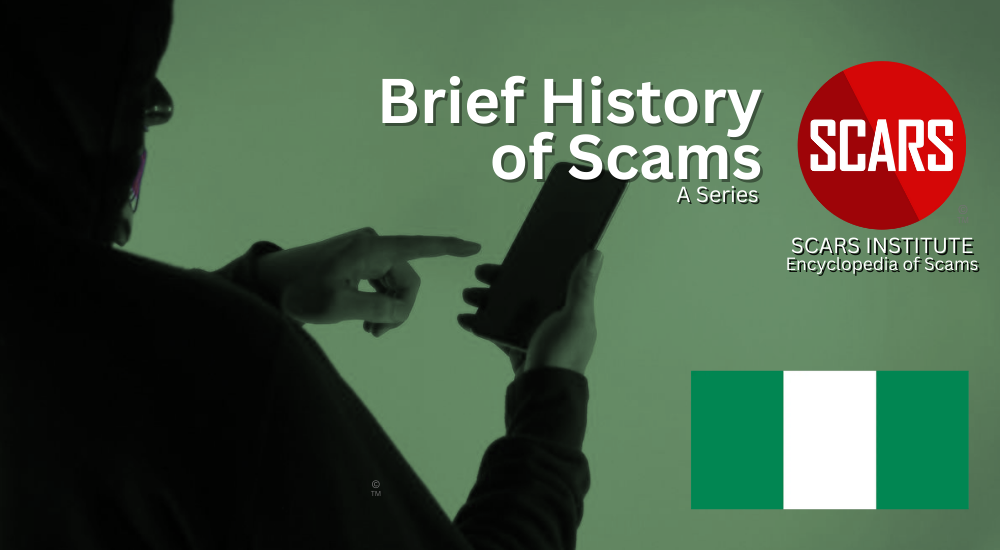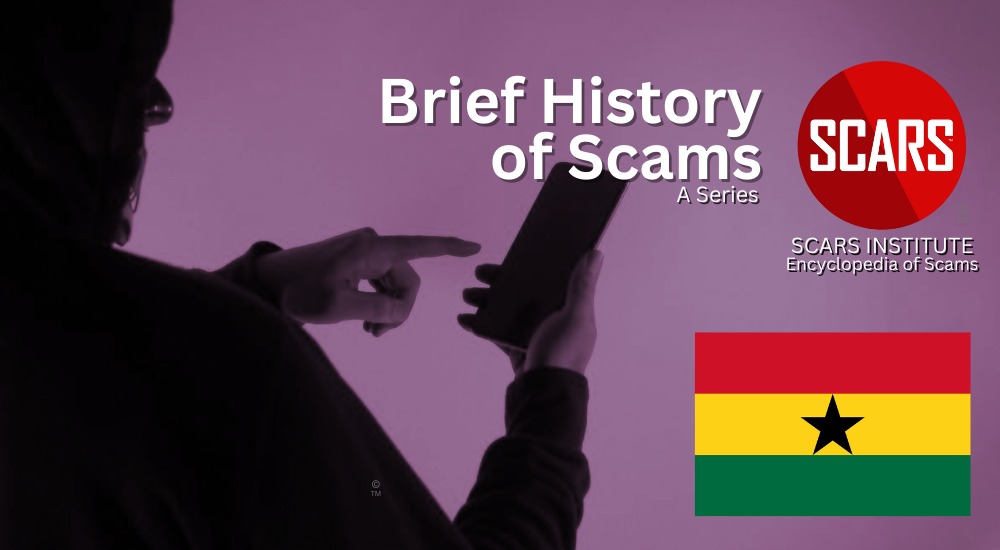
SCARS Institute’s Encyclopedia of Scams™ Published Continuously for 25 Years

A Brief History of Ghana Scams & Scammers
History of Scams- A SCARS Institute Insight
Author:
• SCARS Institute Encyclopedia of Scams Editorial Team – Society of Citizens Against Relationship Scams Inc.
Article Abstract
The history of Ghanaian scams is rooted in economic challenges and the influx of discarded technology, which enabled young Ghanaians to connect to the internet and engage in online fraud. Beginning in the late 1990s, Ghana became a dumping ground for discarded electronics from developed nations, where resourceful individuals collected pieces to build makeshift computers and access the digital world.
This technological access, combined with poverty and unemployment, gave rise to scams, including romance scams, fake business opportunities, and fraudulent online stores.
The practice of Sakawa, which blends online fraud with traditional African spirituality and juju rituals, further fueled the scamming culture in Ghana. Scammers, often referred to as “Sakawa boys,” use spiritual practices to enhance their fraudulent activities and gain wealth.
Despite efforts from the Ghanaian government and international cooperation to crack down on these scams, the issue remains a significant concern due to the evolving tactics and anonymity provided by the internet.

A Brief History of Ghana Scams & Scammers
The History of Ghana Scams and Scammers: How It Began, Evolved, and the Role of Technology
Ghana has gained notoriety over the years as a hub for various forms of online fraud and scamming. While Nigerian scams tend to dominate the conversation, scams originating from Ghana share many similarities with their Nigerian counterparts in terms of socio-economic factors, technological access, and adaptability. Over time, scammers in Ghana have refined their tactics, using advanced tools and deceptive strategies to target individuals worldwide, particularly in romance scams, fake business deals, and other fraudulent schemes. To understand how scams in Ghana evolved, it’s important to explore the social, economic, and technological factors that contributed to their rise.
Early Economic Struggles: The Roots of Ghanaian Scamming
Ghana, like many other developing nations, has faced significant economic challenges since gaining independence from Britain in 1957. Despite having rich natural resources, including gold and cocoa, Ghana’s economy struggled due to political instability, corruption, and economic mismanagement. The poverty and unemployment that resulted from these challenges created an environment in which many young people turned to alternative ways of making money, including fraud.
By the 1980s and 1990s, as Ghana attempted to stabilize its economy, underground activities and informal sectors became more prominent. This economic backdrop set the stage for the rise of scams and fraud as a means for survival. Many young Ghanaians, unable to find legitimate work, started turning to deceitful practices to earn a living. At first, scams were small-scale and local, but with the advent of the internet, the scope and reach of these fraudulent schemes began to grow exponentially.
The Role of Technology: Ghana as a Dumping Ground for Electronics
One of the key factors that facilitated the rise of scamming in Ghana was the influx of discarded electronic devices, especially computers, from developed nations. In the late 1990s and early 2000s, Ghana became one of the major dumping grounds for electronic waste, particularly in areas like Agbogbloshie, a neighborhood in Accra that became infamous as one of the world’s largest e-waste sites. Tons of outdated or broken computers, mobile phones, and other electronic devices were shipped to Ghana from countries like the United States and European nations.
In these e-waste dumps, resourceful and tech-savvy Ghanaians, especially young people, began scavenging for usable parts. They would collect discarded computer components, piece them together, and build makeshift systems to connect to the internet. Despite the toxic and hazardous conditions of working in these e-waste dumps, many individuals saw this as an opportunity to access the online world. With internet access, they began exploring ways to make money, often turning to online scams.
This improvisation marked a turning point for Ghanaian scamming. By assembling their own computers and accessing the internet, scammers could reach victims from across the globe without needing significant resources. Over time, this allowed online fraud to proliferate, as more young Ghanaians tapped into the potential of internet scams to overcome their economic hardships.
Sakawa: The Intersection of Scamming and Spirituality
A unique aspect of Ghanaian scamming is the practice of Sakawa, which combines internet fraud with traditional African spirituality. The term “Sakawa” refers to a form of organized online fraud that incorporates rituals and spiritual beliefs, often involving juju, or black magic, to ensure the success of the scam. Sakawa practitioners believe that by performing certain rituals, they can increase their chances of deceiving their victims and making more money.
Sakawa became a cultural phenomenon in Ghana, with its influence spreading into music, films, and popular culture. It often involves elaborate rituals where scammers consult spiritualists, known as juju men, to gain supernatural aid. These rituals may involve offerings of animals, talismans, or even more extreme practices believed to bring luck or protection from harm during their scamming activities. The scammers believe that these rituals enhance their persuasive abilities or manipulate their victims’ minds, making it easier to extract money from them.
Young men, often referred to as “Sakawa boys,” embraced this lifestyle, flaunting their newfound wealth through expensive cars, jewelry, and designer clothes. They became symbols of a quick path to success, which further glamorized scamming as a viable economic option for many impoverished youths in the country. The material rewards of Sakawa scams not only drew attention from the media but also sparked debate over the moral and social consequences of combining criminal activity with spiritual practices.
Types of Ghanaian Scams
While Sakawa is one of the most well-known forms of scamming in Ghana, fraudsters engage in a variety of other deceptive activities. Some of the common types of scams include:
- Romance Scams: Scammers create fake profiles on social media or dating platforms, posing as wealthy or attractive individuals. They build emotional relationships with their victims over time and eventually ask for money under the guise of needing help with travel, medical emergencies, or business ventures.
- Online Shopping Scams: Scammers set up fake online stores or use social media to advertise products that do not exist. Once the victim makes a purchase, they never receive the goods, and the scammer disappears with the money.
- Fake Business Opportunities: Victims are lured into bogus investment schemes or fraudulent business deals. Scammers claim to have access to lucrative investment opportunities or commodities, only to disappear after receiving funds from the victim.
- Employment Scams: Scammers advertise fake job offers, often targeting individuals seeking work abroad. Victims are asked to pay upfront fees for visa processing or travel expenses, only to find out that the job offer was fraudulent.
Social Media and Online Platforms
The rise of social media platforms like Facebook, Instagram, and WhatsApp has made it easier for Ghanaian scammers to connect with potential victims. These platforms allow scammers to create fake profiles, impersonate foreign nationals, and reach out to victims with elaborate stories. The anonymity provided by the internet enables scammers to build trust with victims, often without ever meeting them in person. By creating a false sense of security and emotional connection, scammers can manipulate their victims into sending money, sometimes over the course of months or even years.
Government and Law Enforcement Efforts
Over the years, the Ghanaian government has struggled to contain the rise of scamming and online fraud due to limited resources, corruption, and the transnational nature of these crimes. In recent years, however, the government has made efforts to crack down on internet fraud through legislation and law enforcement initiatives. The establishment of Ghana’s Cyber Crime Unit and the Economic and Organized Crime Office (EOCO) has been one step toward tackling the issue, as this unit works with international agencies to investigate and prosecute online fraudsters.
Public awareness campaigns have also been launched to educate the public about the risks of online fraud and the potential consequences of engaging in scamming activities. However, as scams become more sophisticated, law enforcement faces challenges in keeping up with the evolving tactics used by scammers.
SCARS Institute Activities
For many years SCARS has been working behind the scenes to bring about change. Starting in 2024, SCARS Institute’s Managing Director Dr. Tim McGuinness has provided dedicated training to Ghana law enforcement and criminal justice professionals. These actions have helped to bring about the largest arrest of West African scammers in history in September 2024.
Summary
The history of Ghanaian scams is a story of resourcefulness and desperation, driven by economic hardship and technological advancements. From scavenging computers in e-waste dumps to creating complex fraudulent schemes online, scammers in Ghana have adapted to changing circumstances and tapped into global networks to carry out their crimes. Sakawa, with its blend of internet fraud and spiritual rituals, adds a unique cultural dimension to the scamming landscape in Ghana.
As the internet continues to provide opportunities for anonymity and global reach, scams originating from Ghana remain a significant concern. Vigilance, education, and international cooperation are necessary to combat these fraudulent schemes and protect potential victims worldwide.
-/ 30 /-
What do you think about this?
Please share your thoughts in a comment below!
Table of Contents
LEAVE A COMMENT?
Recent Comments
On Other Articles
- Arwyn Lautenschlager on Love Bombing And How Romance Scam Victims Are Forced To Feel: “I was love bombed to the point that I would do just about anything for the scammer(s). I was told…” Feb 11, 14:24
- on Dani Daniels (Kira Lee Orsag): Another Scammer’s Favorite: “You provide a valuable service! I wish more people knew about it!” Feb 10, 15:05
- on Danielle Delaunay/Danielle Genevieve – Stolen Identity/Stolen Photos – Impersonation Victim UPDATED 2024: “We highly recommend that you simply turn away form the scam and scammers, and focus on the development of a…” Feb 4, 19:47
- on The Art Of Deception: The Fundamental Principals Of Successful Deceptions – 2024: “I experienced many of the deceptive tactics that romance scammers use. I was told various stories of hardship and why…” Feb 4, 15:27
- on Danielle Delaunay/Danielle Genevieve – Stolen Identity/Stolen Photos – Impersonation Victim UPDATED 2024: “Yes, I’m in that exact situation also. “Danielle” has seriously scammed me for 3 years now. “She” (he) doesn’t know…” Feb 4, 14:58
- on An Essay on Justice and Money Recovery – 2026: “you are so right I accidentally clicked on online justice I signed an agreement for 12k upfront but cd only…” Feb 3, 08:16
- on The SCARS Institute Top 50 Celebrity Impersonation Scams – 2025: “Quora has had visits from scammers pretending to be Keanu Reeves and Paul McCartney in 2025 and 2026.” Jan 27, 17:45
- on Scam Victims Should Limit Their Exposure To Scam News & Scammer Photos: “I used to look at scammers photos all the time; however, I don’t feel the need to do it anymore.…” Jan 26, 23:19
- on After A Scam, No One Can Tell You How You Will React: “This article was very informative, my scams happened 5 years ago; however, l do remember several of those emotions and/or…” Jan 23, 17:17
- on Situational Awareness and How Trauma Makes Scam Victims Less Safe – 2024: “I need to be more observant and I am practicing situational awareness. I’m saving this article to remind me of…” Jan 21, 22:55
ARTICLE META
Important Information for New Scam Victims
- Please visit www.ScamVictimsSupport.org – a SCARS Website for New Scam Victims & Sextortion Victims
- Enroll in FREE SCARS Scam Survivor’s School now at www.SCARSeducation.org
- Please visit www.ScamPsychology.org – to more fully understand the psychological concepts involved in scams and scam victim recovery
If you are looking for local trauma counselors please visit counseling.AgainstScams.org or join SCARS for our counseling/therapy benefit: membership.AgainstScams.org
If you need to speak with someone now, you can dial 988 or find phone numbers for crisis hotlines all around the world here: www.opencounseling.com/suicide-hotlines
A Note About Labeling!
We often use the term ‘scam victim’ in our articles, but this is a convenience to help those searching for information in search engines like Google. It is just a convenience and has no deeper meaning. If you have come through such an experience, YOU are a Survivor! It was not your fault. You are not alone! Axios!
A Question of Trust
At the SCARS Institute, we invite you to do your own research on the topics we speak about and publish, Our team investigates the subject being discussed, especially when it comes to understanding the scam victims-survivors experience. You can do Google searches but in many cases, you will have to wade through scientific papers and studies. However, remember that biases and perspectives matter and influence the outcome. Regardless, we encourage you to explore these topics as thoroughly as you can for your own awareness.
Statement About Victim Blaming
SCARS Institute articles examine different aspects of the scam victim experience, as well as those who may have been secondary victims. This work focuses on understanding victimization through the science of victimology, including common psychological and behavioral responses. The purpose is to help victims and survivors understand why these crimes occurred, reduce shame and self-blame, strengthen recovery programs and victim opportunities, and lower the risk of future victimization.
At times, these discussions may sound uncomfortable, overwhelming, or may be mistaken for blame. They are not. Scam victims are never blamed. Our goal is to explain the mechanisms of deception and the human responses that scammers exploit, and the processes that occur after the scam ends, so victims can better understand what happened to them and why it felt convincing at the time, and what the path looks like going forward.
Articles that address the psychology, neurology, physiology, and other characteristics of scams and the victim experience recognize that all people share cognitive and emotional traits that can be manipulated under the right conditions. These characteristics are not flaws. They are normal human functions that criminals deliberately exploit. Victims typically have little awareness of these mechanisms while a scam is unfolding and a very limited ability to control them. Awareness often comes only after the harm has occurred.
By explaining these processes, these articles help victims make sense of their experiences, understand common post-scam reactions, and identify ways to protect themselves moving forward. This knowledge supports recovery by replacing confusion and self-blame with clarity, context, and self-compassion.
Additional educational material on these topics is available at ScamPsychology.org – ScamsNOW.com and other SCARS Institute websites.
Psychology Disclaimer:
All articles about psychology and the human brain on this website are for information & education only
The information provided in this article is intended for educational and self-help purposes only and should not be construed as a substitute for professional therapy or counseling.
While any self-help techniques outlined herein may be beneficial for scam victims seeking to recover from their experience and move towards recovery, it is important to consult with a qualified mental health professional before initiating any course of action. Each individual’s experience and needs are unique, and what works for one person may not be suitable for another.
Additionally, any approach may not be appropriate for individuals with certain pre-existing mental health conditions or trauma histories. It is advisable to seek guidance from a licensed therapist or counselor who can provide personalized support, guidance, and treatment tailored to your specific needs.
If you are experiencing significant distress or emotional difficulties related to a scam or other traumatic event, please consult your doctor or mental health provider for appropriate care and support.
Also read our SCARS Institute Statement about Professional Care for Scam Victims – click here to go to our ScamsNOW.com website.
















Thank you for your comment. You may receive an email to follow up. We never share your data with marketers.